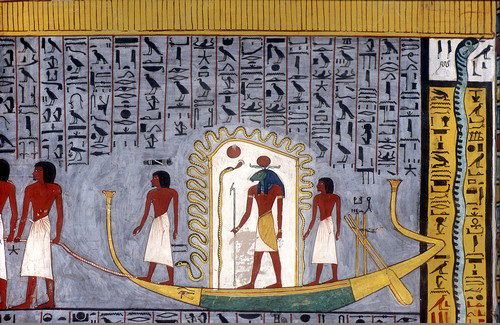Reference




Reference




OpenAI's Answer
The concept of the soul has been interpreted in various ways across different ancient cultures and texts. Here is an overview of how some of these ancient texts and civilizations explained the concept of the soul:
Ancient Egyptian Conception
The ancient Egyptians had a complex understanding of the soul. They believed the soul was composed of several parts:
- Ba: Often depicted as a bird with a human head, it represented an individual's personality.
- Ka: A vital essence that remained in the tomb and needed sustenance.
- Akh: The spirit that survived death and could interact with the living.
- Other components: These include the Khat (physical body), Ren (name), and Sheut (shadow).

For more detailed reading: Wikipedia: Ancient Egyptian Conception of the Soul
Ancient Greek Philosophy
In Greek philosophy, different philosophers had varying views:
- Plato: Described the soul as an immortal entity, which existed before birth and survived after death. He believed the soul was tripartite, comprising the rational, spirited, and appetitive parts.
- Aristotle: Saw the soul as the essence of life, present in all living beings. According to him, the soul was not a separate entity but rather the form that gives life to the body.

For more details: TheCollector: Ancient Greek Theories of the Human Soul
Vedic Texts (Ancient Indian Philosophy)
In the Vedic tradition, the soul or Atman is described as the true self of an individual, which is eternal and transcends the physical existence. The Upanishads discuss the soul's nature and its connection with the universal spirit, Brahman.
- Mundaka Upanishad (3.1.9): Describes the soul as atomic in size and perceivable by the purest intellect.
For more reading: Stephen Knapp: Vedic Description of the Soul
Hebrew Bible (Nephesh)
The Hebrew Bible uses the word Nephesh to describe the soul. It is often depicted as the life-force or living being, rather than a distinct entity separate from the body.
- The soul is associated with life and breath and signifies the whole living being.
For further details: Bible Project: Nephesh-Soul
Other Sources
- Philosophical Anthropology: Discusses various early conceptions of the soul and its role as a distinct entity within the body. Britannica: Philosophical Anthropology
- Psychology Today: Provides overviews of ancient concepts regarding the mind, brain, and soul. Psychology Today: Ancient Concepts of the Mind, Brain, and Soul
These interpretations offer a deep and varied understanding of ancient perspectives on the soul, reflecting their rich spiritual and philosophical traditions.